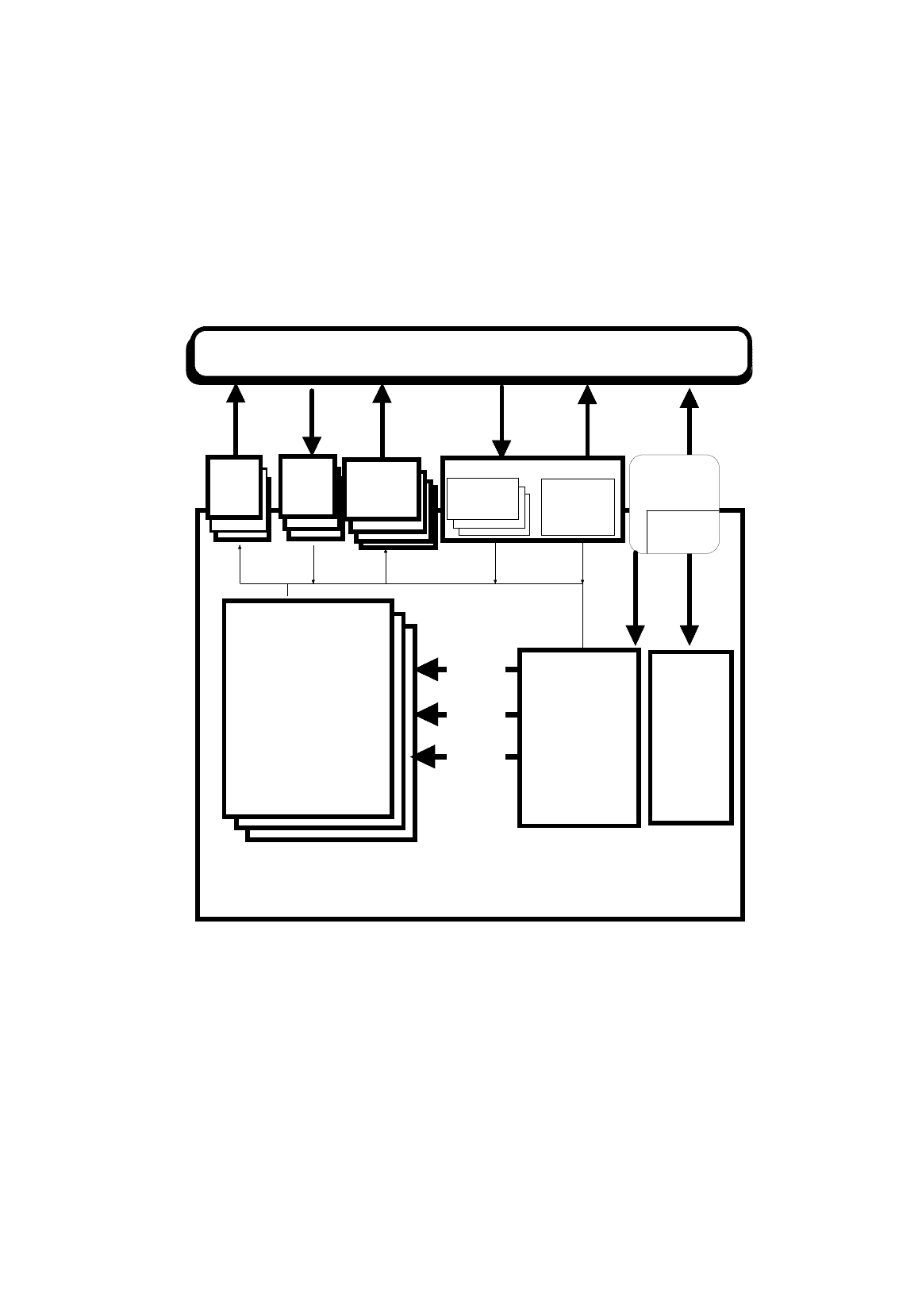Спецификация протокола Profibus
Подождите немного. Документ загружается.


Page 751
PROFIBUS-Specification-Normative-Parts-8:1997
Copyright by PNO 1997 - all rights reserved
9.5 Local Functions at DP-Slave
9.5.1 General
On the interface to the User-Interface the DDLM of the DP-Slave makes available
the functions for local interactions between the User-Interface and the DDLM.
The DDLM maps the DDLM functions onto the confirmed services of FDL and FMA1/2.
The DDLM performs the handling of the local service confirmation independent of
FDL and FMA1/2. If a local error occurs during the service execution in the FDL
or in FMA1/2 then a DDLM_Fault.ind is generated from DDLM.
9.5.2 DDLM_Slave_Init
With this function the local FDL and the local FMA1/2 is initialized at the DP-
Slave for data communication and the local station address is delivered.
This function is mapped from the DDLM onto the following services of FMA1/2:
- Reset FMA1/2
- Set Value FMA1/2
- RSAP Activate FMA1/2
Table 26. DDLM_Slave_Init
+------------------------------+------+
! Parameter Name ! .req !
+------------------------------+------+
! Station_Address ! M !
! Baud_Rate ! U !
! Medium_red ! U !
+------------------------------+------+
In implementations where the layer 2 bus parameters are locally known in layer
2, the parameters Baud_Rate and Medium_red may be omitted.
Station_Address:
The parameter Station_Address specifies the local FDL address.
Baud_Rate:
The parameter Baud_Rate specifies the baud rate locally set.
Medium_red:
The parameter Medium_red specifies whether the system does or does not use a
redundant transmission technique.

Page 752
PROFIBUS-Specification-Normative-Parts-8:1997
Copyright by PNO 1997 - all rights reserved
9.5.3 DDLM_Set_minTsdr
With this function the operation parameter minTsdr is delivered to the local FDL
at the DP-Slave.
This function is mapped from the DDLM onto the following FMA1/2 service:
- Set Value FMA1/2
Table 27. DDLM_Set_minTsdr
+------------------------------+------+
! Parameter Name ! .req !
+------------------------------+------+
! minTsdr ! M !
+------------------------------+------+
minTsdr:
The parameter minTsdr specifies the value for the minimum station delay time
(min T
SDR
) at the responder. If this value is zero then no change will take
effect.
9.5.4 DDLM_Enter
With this function the local FDL and the local FMA1/2 of the DP-Slave are
initialized for the user data exchange mode of the DDLM. At the same time the
assigned SAPs for the output data and the function DDLM_Global_Control are
activated and parameterized with a layer 2 access protection.
This function is mapped from the DDLM onto the following services of FMA1/2:
- RSAP Activate FMA1/2
- SAP Activate FMA1/2
Table 28. DDLM_Enter
+------------------------------+------+
! Parameter Name ! .req !
+------------------------------+------+
! Master_Add ! M !
+------------------------------+------+
Master_Add
The parameter Master_Add specifies the FDL address of the master which gets
access for direct writing of the outputs and for requesting the function
DDLM_Global_Control.

Page 753
PROFIBUS-Specification-Normative-Parts-8:1997
Copyright by PNO 1997 - all rights reserved
9.5.5 DDLM_Leave
With this function the local FDL and the local FMA1/2 of the DP-Slave are
reconfigured and the user data exchange mode of the DDLM is terminated.
At the same time layer 2 access protection, the assigned SAPs for the output
data and the function DDLM_Global_Control in the layer 2 are deactivated. This
function has no input parameters.
This function is mapped from the DDLM onto the following FMA1/2 service:
- SAP Deactivate FMA1/2
9.5.6 DDLM_Fault
With this function the DDLM of the DP-Slave indicates an error to the User-
Interface during the execution of a local FDL or FMA1/2 service. This function
has no input and output parameters.
This function will be transferred by the DDLM to the User-Interface after the
occurrence of one of the following events:
- FMA1/2_RESET.con (NO/IV)
- FMA1/2_SET_VALUE.con (NO/IV)
- FMA1/2_RSAP_ACTIVATE.con (NO/IV)
- FMA1/2_SAP_ACTIVATE.con (NO/IV)
- FMA1/2_SAP_DEACTIVATE.con (NO/IV)
- FDL_REPLY_UPDATE.con (LS/LR/IV)
- FDL_DATA_REPLY.ind (DSAP inadmissible)
- FDL_DATA.ind (DSAP inadmissible)
- unknown FDL or FMA1/2 primitive
9.6 Local Functions at DP-Master
9.6.1 General
At the interface to the User-Interface the DDLM of the DP-Master provides
functions for local interactions between the User-Interface and the DDLM.
The DDLM maps the DDLM functions to the confirmed services of FDL and FMA1/2.
The treatment of local service confirmations will be done by the DDLM. If a
local error occurs in the FDL or in the FMA1/2 during execution of a local
service, the DDLM will produce a DDLM_Fault.ind.
9.6.2 DDLM_Master_Init
With this function the User-Interface of the DP-Master prepares the DDLM
(Requester) for communication with DP-Slaves.
This function will be mapped by the DDLM on the following service of FMA1/2:
- SAP Activate FMA1/2
This function has no parameters.

Page 754
PROFIBUS-Specification-Normative-Parts-8:1997
Copyright by PNO 1997 - all rights reserved
9.6.3 DDLM_Responder_Init
With this function the User-Interface of the DP-Master (class 1) prepares the
DDLM (Responder) for communication with a DP-Master (class 2).
This function will be mapped by the DDLM on the following services of FMA1/2:
- RSAP Activate FMA1/2
- SAP Activate FMA1/2
Table 29. DDLM_Responder_Init
+------------------------------+------+------+
! Parameter Name ! .req ! .con !
+------------------------------+------+------+
! Poll_Timeout ! M ! !
+------------------------------+------+------+
Poll-Timeout:
The parameter Poll_Timeout specifies the maximum period of time during which the
response has to be picked up by the requester.
9.6.4 DDLM_Requester_Init
With this function the User-Interface of the DP-Master (class 2) prepares the
DDLM (Requester) for communication with a DP-Master (class 1).
This function will be mapped by the DDLM on the following service of the FMA1/2:
- SAP Activate FMA1/2
Table 30. DDLM_Requester_Init
+------------------------------+------+------+
! Parameter Name ! .req ! .con !
+------------------------------+------+------+
! Poll_Timeout ! M ! !
+------------------------------+------+------+
Poll-Timeout:
The parameter Poll_Timeout specifies the maximum period of time in which the
response has to be received from the responder.

Page 755
PROFIBUS-Specification-Normative-Parts-8:1997
Copyright by PNO 1997 - all rights reserved
9.6.5 DDLM_Reset
With this function the local FDL and FMA1/2 will be reset.
This function will be mapped by the DDLM on the following service of the FMA1/2:
- Reset FMA1/2
This function has no parameters.
9.6.6 DDLM_Set_Bus_Par
With this function the layer 2 parameters from the bus parameter set will be
passed to the FDL.
This function will be mapped by the DDLM on the following service of the FMA1/2:
- Set Value FMA1/2
Table 31. DDLM_Set_Bus_Par
+------------------------------+------+------+
! Parameter Name ! .req ! .con !
+------------------------------+------+------+
! Bus_Para ! M ! !
! ! ! !
! Status ! ! M !
+------------------------------+------+------+
Bus_Para:
Description see section "Data Interface".
Status:
The parameter Status indicates success or failure of the function.
Possible values: OK,NO,IV
9.6.7 DDLM_Set_Value
With this function the FDL parameters can be passed to FMA1/2.
This function will be mapped by the DDLM on the following service of the FMA1/2:
- Set Value FMA1/2

Page 756
PROFIBUS-Specification-Normative-Parts-8:1997
Copyright by PNO 1997 - all rights reserved
Table 32. DDLM_Set_Value
+------------------------------+------+------+
! Parameter Name ! .req ! .con !
+------------------------------+------+------+
! Variable ! M ! !
! Value ! M ! !
! ! ! !
! Status ! ! M !
+------------------------------+------+------+
Variable:
This parameter selects the FDL parameter which has to be changed.
Value:
This parameter contains the new value for the FDL parameter.
Status:
The parameter Status indicates success or failure of the function.
Possible values: OK,NO,IV
9.6.8 DDLM_Read_Value
With this function it is possible to read the FDL Variables.
This function will be mapped by the DDLM on the following service of the FMA1/2:
- Read Value FMA1/2
Table 33. DDLM_Read_Value
+------------------------------+------+------+
! Parameter Name ! .req ! .con !
+------------------------------+------+------+
! Variable ! M ! !
! ! ! !
! Status ! ! M !
! Value ! ! C !
+------------------------------+------+------+
Variable:
The parameter Variable selects the FDL Variable which has to be read.
Value:
This parameter contains the actual value of the read FDL parameter.
Status:
The parameter Status indicates success or failure of the function.
Possible values: OK,NO,IV

Page 757
PROFIBUS-Specification-Normative-Parts-8:1997
Copyright by PNO 1997 - all rights reserved
9.6.9 DDLM_Delete_SC
With this function the statistic counters will be cleared (see section
"Statistic Counters").
This function will be mapped by the DDLM on the following service of the FMA1/2:
- Set Value FMA1/2
Table 34. DDLM_Delete_SC
+------------------------------+------+------+
! Parameter Name ! .req ! .con !
+------------------------------+------+------+
! Address ! M ! !
! ! ! !
! Status ! ! M !
+------------------------------+------+------+
Address:
The statistic counters of the station which is addressed by the parameter
Address will be cleared.
Status:
The parameter Status indicates success or failure of the function.
Possible values: OK,NO,IV
9.6.10 DDLM_Fault
With this function the DDLM indicates an error during execution of a local FDL
or FMA1/2 service to the User-Interface.
This function has no input and output parameters.
This function will be passed by the DDLM to the User-Interface after the
occurrence of one of the following events:
- FMA1/2_RESET.con (NO/IV)
- FMA1/2_SET_VALUE.con (NO/IV)
- FMA1/2_RSAP_ACTIVATE.con (NO/IV)
- FMA1/2_SAP_ACTIVATE.con (NO/IV)
- FMA1/2_SAP_DEACTIVATE.con (NO/IV)
- FDL_REPLY_UPDATE.con (LS/LR/IV)
- FDL_DATA_REPLY.ind (DSAP inadmissible)
- FDL_DATA.ind (DSAP inadmissible)
- unknown FDL or FMA1/2 Primitive
9.6.11 DDLM_Event
With this function the DDLM indicates an event notification of the layer 2 to
the User.

Page 758
PROFIBUS-Specification-Normative-Parts-8:1997
Copyright by PNO 1997 - all rights reserved
Table 35. DDLM_Event
+------------------------------+------+
! Parameter Name ! .ind !
+------------------------------+------+
! Event ! M !
! Add_Info ! C !
+------------------------------+------+
Event, Add_Info:
These parameters can take the values which are allowed for the Event FMA1/2
service (e. g. Out_Of_Ring, GAP_event).

Page 759
PROFIBUS-Specification-Normative-Parts-8:1997
Copyright by PNO 1997 - all rights reserved
10 Interface between User-Interface and User
10.1 DP-Master (class 1)
The interface between the User-Interface and the User at the DP-Master (class 1)
is defined as a data and service interface. At this interface all interactions
for the communication between the DP-Master (class 1) and the DP-Slaves will be
handled. This interface will be described in detail as follows.
Load_Bus_Par
User
Master-Parameterset
Bus-
Parameterset
User-Interface
Input_
Data
Slave-
Parameterset
Set_Mode
Global_Control
Mode_Chan
g
ed
Mark
Read_Value
Delet_SC
Start
Stop
Continue
USIF
Scheduler
USIF-STATE:
- Offline
- Stop
- Clear
- Operate
Service_
Handler
Output_
Data
Diagnostic_
Data
Slave_Handler
Figure 17. Interface between User and User-Interface at
the DP-Master (class 1)
10.1.1 Data Interface
a) Bus Parameter Set:
The current bus parameter set is located in this area.
The bus parameter set consists of:

Page 760
PROFIBUS-Specification-Normative-Parts-8:1997
Copyright by PNO 1997 - all rights reserved
- FDL operational parameter
- Error_Action_Flag:
This bit will be evaluated in the operation mode Operate and Clear. If data
transfer to at least one activated DP-Slave was impossible during
Data_Control_Time and if the Error_Action_Flag is set, the operation mode will
change from Operate to Clear. If the Error_Action_Flag is not set, the User-
Interface will remain in the operation mode Operate in the case of an error.
If the operation mode of the User-Interface shall be changed from Clear to
Operate, this will only be done if in the Data_Control_Time all DP-Slaves where
in the user data exchange mode if the bit Error_Action_Flag was set.
- Min_Slave_Interval:
This parameter specifies the smallest allowed period of time between two slave
poll cycles. This ensures that the sequence of function requests from the DP-
Master can be handled by the DP-Slave. This period of time will be complied by
the DP-Master (class 1) for every master-slave function with exception of the
function Global_Control. For the function Global_Control the user is responsible
for compliance with Min_Slave_Interval.
- Poll_Timeout:
In the case of master-master communication this parameter specifies the maximum
amount of time it may take the requester to fetch the response.
- Data_Control_Time
This parameter specifies the period of time during which the Data_Transfer_List
(see section "Control Intervals") will be updated at least once and will be made
available to the user.
The User can only read the current bus parameter set. The User can pass a new
bus parameter set to the User-Interface by means of the function Load_Bus_Par.
After that, the User-Interface transfers the new bus parameter set to the
current bus parameter set and loads the changed FDL operational parameters into
FDL control.
b) DP-Slave parameter sets:
The User-Interface needs a DP-Slave parameter set for every DP-Slave. This
parameter set contains the control bits Active and New_Prm.
- Active-Flag:
If the Active-Flag has the value False, the DP-Master stops the DP-Slave
handling to the concerned DP-Slave. In this state it is allowed to change
the DP-Slave parameter set, for Example by a DP-Master (class 2) with the
function DDLM_Download.
If the Active-Flag has the value True, the DP-Slave handling will be done
by the DP-Master (class 1) to the concerned DP-Slave. Changing the DP-
Slave parameter set in this state is reduced possible (see also New_Prm-
Flag).
- New_Prm-Flag
If this flag has the value False, user data will be transferred to this
DP-Slave in the user data exchange mode. If the flag is True, for one data
cycle parameter data will be transferred instead of user data. The
consistency of the parameter data has to be guaranteed by local measures.
After transmitting this data successfully the DP-Master (class 1) sets the
